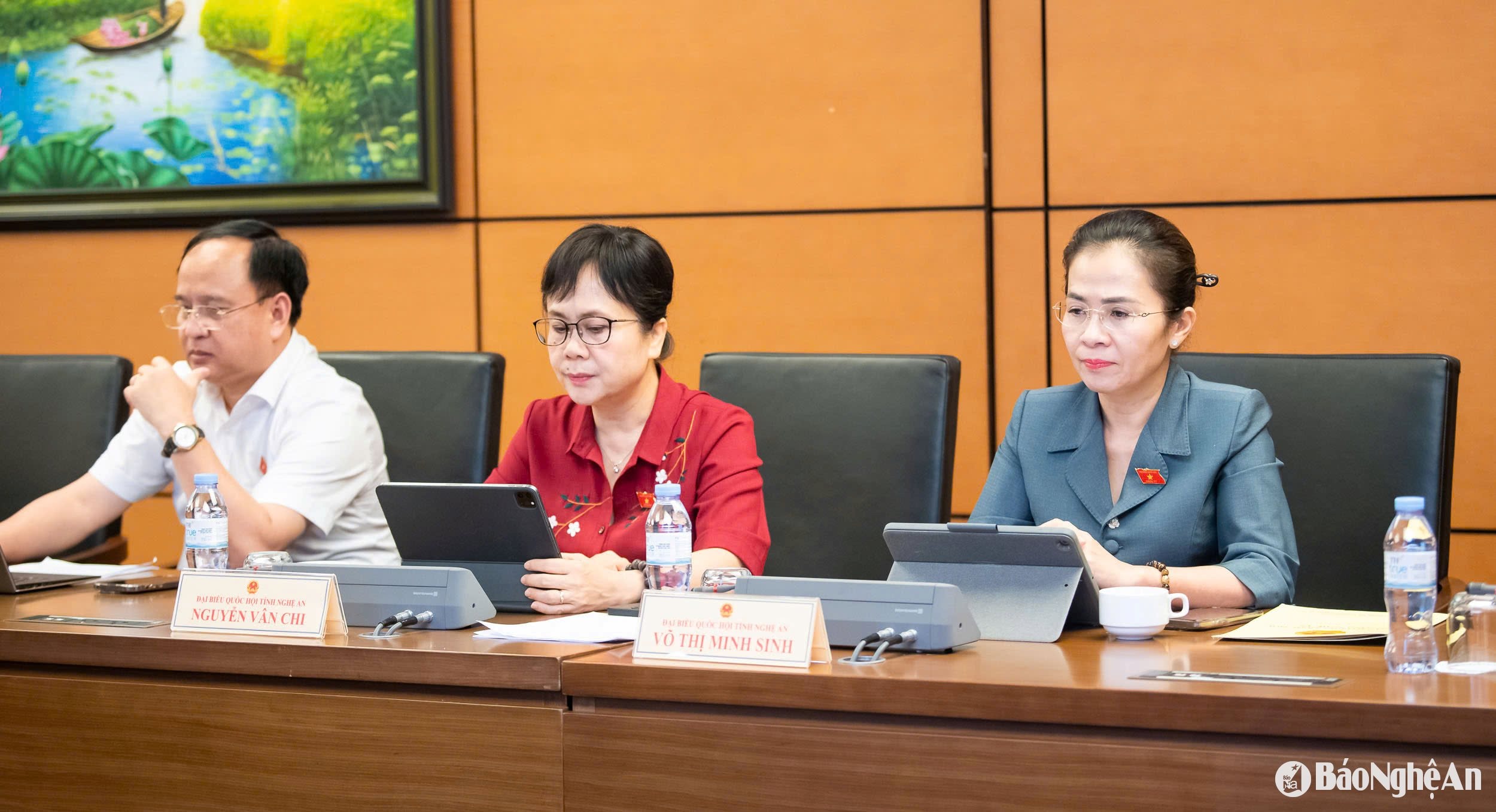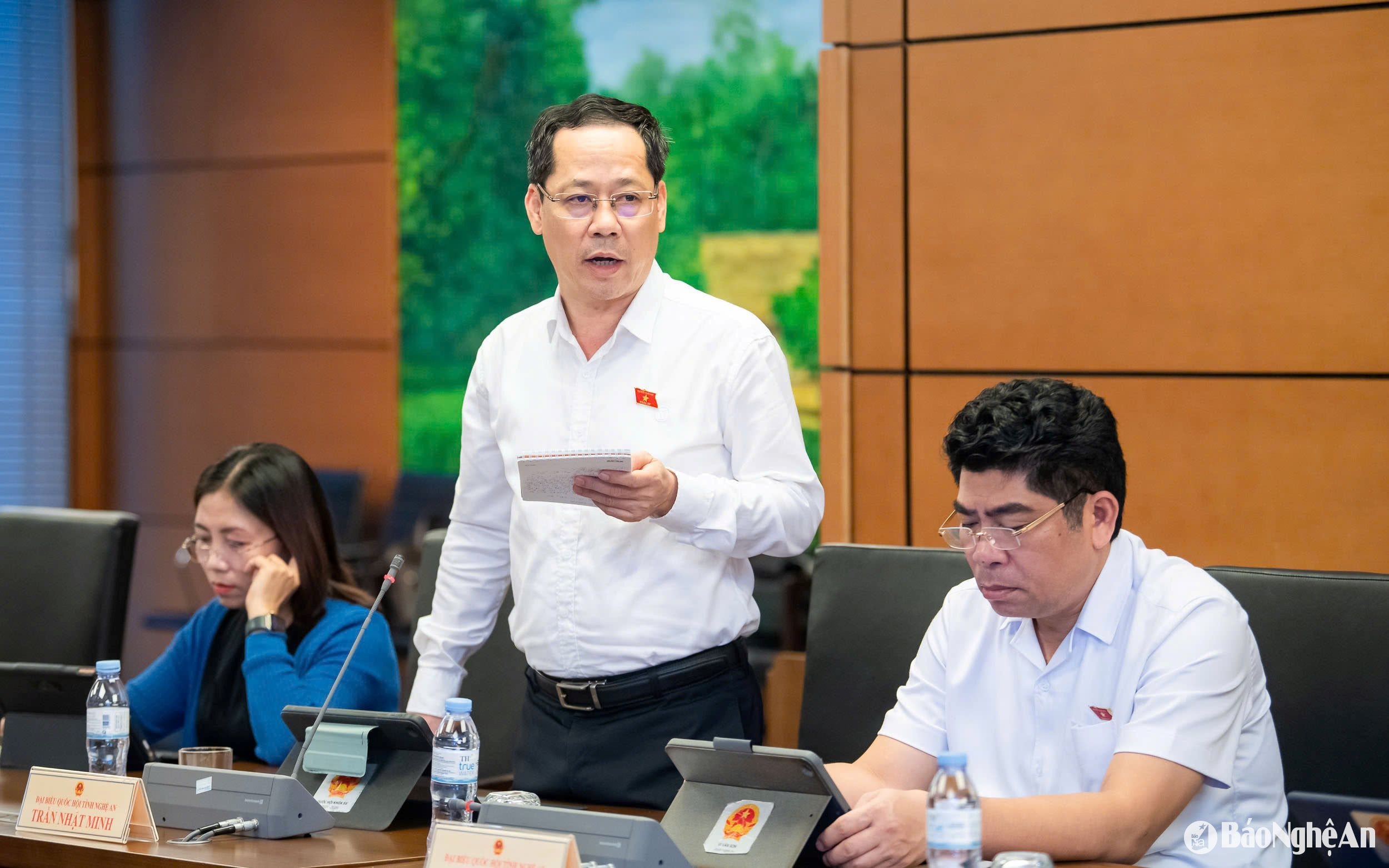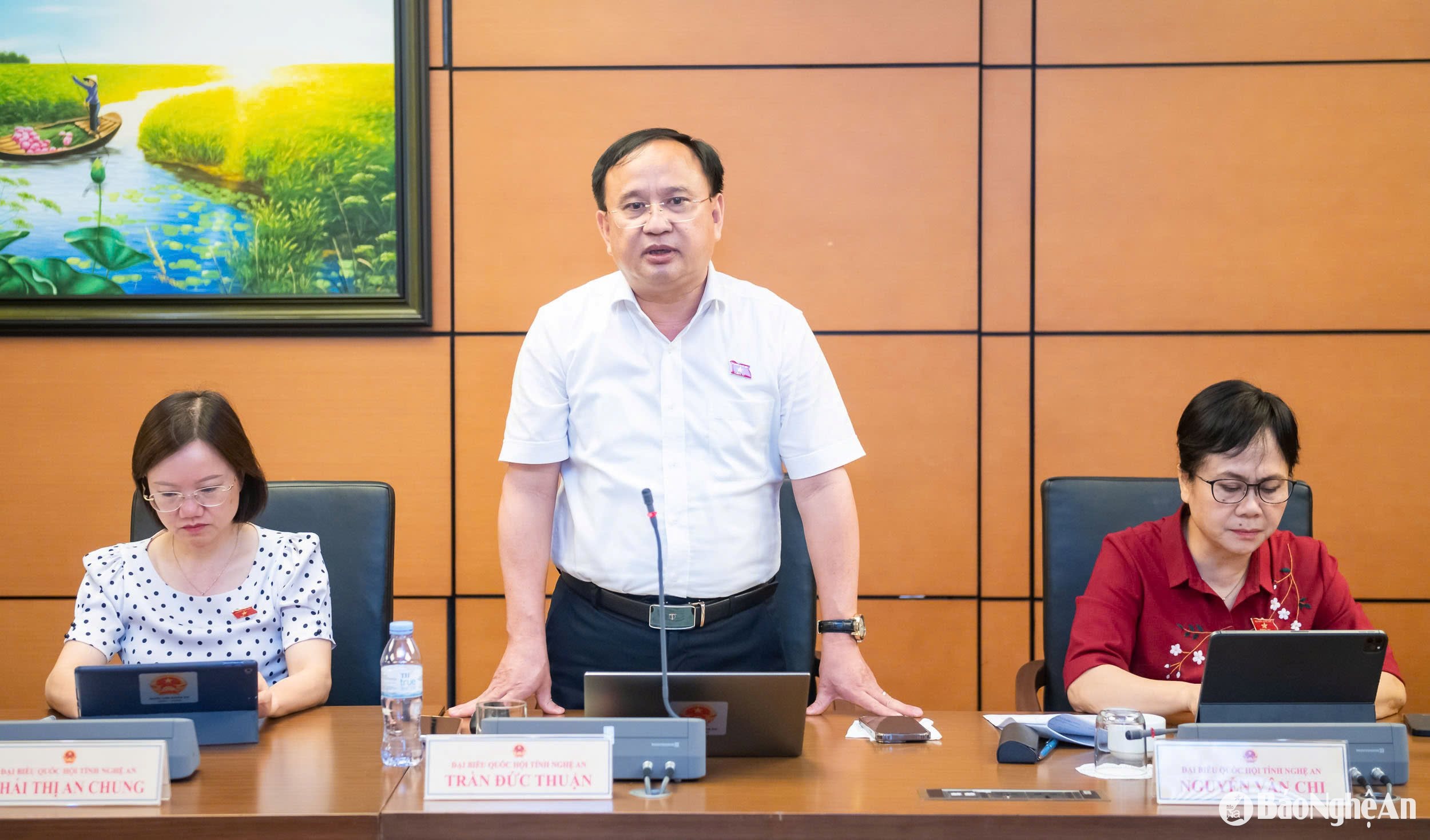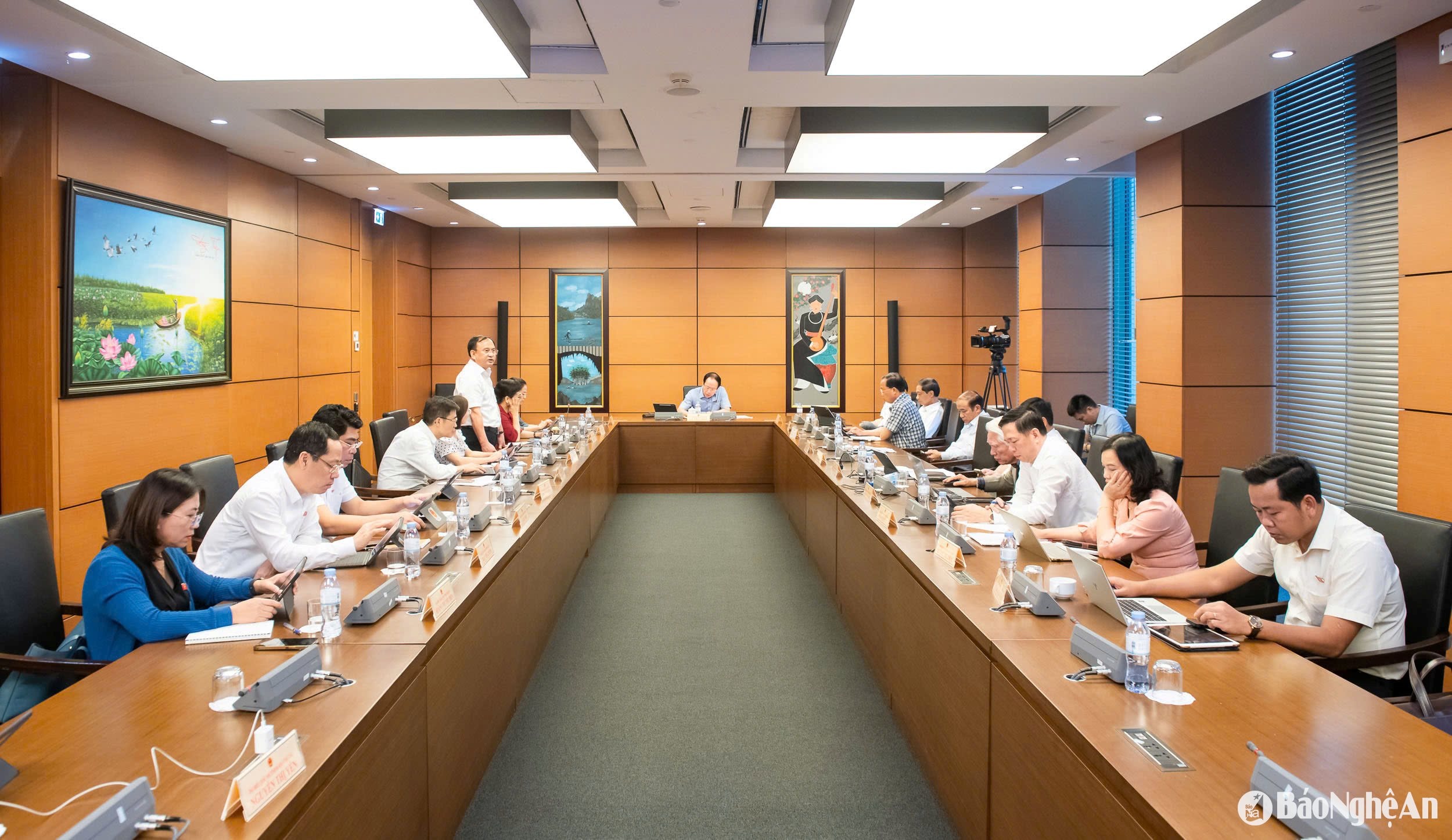National Assembly delegates from Nghe An discuss in groups about draft laws
On the afternoon of May 20, the National Assembly discussed in groups: the draft Penal Code (amended); the draft Law amending and supplementing a number of articles of the Criminal Procedure Code; the draft Law amending and supplementing a number of articles of the Law on Credit Institutions.

Discussing at Group 4 with the National Assembly delegation of Hai Phong city and Ba Ria - Vung Tau province, the National Assembly delegation of Nghe An province had 3 opinions.
Amnesty procedures need to be clear
Speaking on the Draft Law on Amending and Supplementing a Number of Articles of the Criminal Procedure Code, Mr. Tran Nhat Minh - National Assembly Deputy in charge of Nghe An delegation said that the regulation that in cases of particularly serious crimes with the highest level of the penalty framework prescribed by the Criminal Code is 20 years in prison, where the regional People's Procuracy exercises the right to prosecute, supervise and investigate, the provincial People's Procuracy will extend the term for the first time is unnecessary.
Because the authority to extend the detention of the regional People's Procuracy has been limited by the regulation: The regional People's Procuracy has the right to extend the detention for less serious, serious and very serious crimes. That means, by default, especially serious crimes are not under the authority of the regional People's Procuracy to extend.

Delegates assessed that the new point of this draft law is to increase the jurisdiction of the regional People's Court to conduct first-instance trials of cases of particularly serious crimes where the maximum penalty prescribed by the Penal Code is up to 20 years in prison.
Therefore, Mr. Tran Nhat Minh proposed that the drafting agency should consider decentralizing the authority of the regional People's Procuracy to extend the detention for the first time in cases of particularly serious cases where the highest penalty prescribed by the Penal Code is up to 20 years in prison; and if the second extension is extended, it should be under the authority of the provincial People's Procuracy. This is consistent with the policy of decentralization and delegation of authority.
Regarding the regulations on procedures for reviewing death sentences before execution, the draft law supplements regulations to overcome practical difficulties in deciding to execute death sentences and organizing execution of death sentences, in which the reason is that the Criminal Procedure Code does not have regulations on the time limit for reviewing petitions for clemency of death sentences.
However, after studying this regulation, Mr. Tran Nhat Minh said that the proposed content is still not clear enough, not strict and difficult to determine the time frame to calculate the time limit. Specifically, the draft stipulates: "Within 1 year from the date of receiving the report of the Chief Justice of the Supreme People's Court and the Chief Prosecutor of the Supreme People's Procuracy, the President shall consider and decide on clemency for the convicted person. After the above time limit, if there is no decision on clemency, the Chief Justice of the Provincial People's Court that conducted the first instance trial shall organize the execution of the death sentence according to regulations".
According to the delegate, it will be very difficult to determine the "date of receipt of the report of the Chief Justice of the Supreme People's Court and the Chief Prosecutor of the Supreme People's Procuracy" specifically because in practice, the two reports mentioned above are not sent to the Office of the President at the same time; at the same time, it will be very difficult for the Chief Justice of the People's Court of First Instance to determine the date the President receives the two reports above if the provisions are general as in the draft.
“These regulations are related to the human right to life, so they need to be strict and extremely careful to avoid irreparable violations,” said delegate Tran Nhat Minh, proposing amendments to regulate the responsibility of the Office of the President in notifying the Chief Justice of the Provincial People's Court that conducted the first instance trial of the specific time of receiving the report of the Chief Justice of the Supreme People's Court and the Chief Prosecutor of the Supreme People's Procuracy.
Or amend, supplement this provision based on the time frame of the verdict taking effect, specifically: "In case the convicted person submits a petition for clemency to the President within 15 days from the date the verdict takes legal effect, the Chief Justice of the Supreme People's Court and the Chief Prosecutor of the Supreme People's Procuracy must report to the President to consider the petition for clemency and within 1 year from the date the verdict takes legal effect, the President shall consider and decide on clemency for the convicted person...".
Also commenting on this draft law, Major General Tran Duc Thuan - a full-time member of the National Assembly's Committee for National Defense, Security and Foreign Affairs, said that the provision of life imprisonment without parole is a humane step forward, demonstrating the spirit of humanity, while still ensuring high deterrence. This penalty helps eliminate the risk of irreparable wrongful convictions after the death penalty has been carried out, in line with the international trend of gradually eliminating the death penalty and in line with international conventions on human rights that Vietnam has joined.

However, according to him, this punishment also raises a number of issues: The deterrent effect on criminals, especially particularly serious crimes such as mass murder and terrorism, may be reduced; it increases the burden on the prison system...
Therefore, delegates suggested that there should be strict regulations on the conditions for applying this penalty, and that it should only be applied instead of the death penalty for certain specific types of crimes, to avoid abuse and ensure more special prison management for this group.
Delegates also agreed with the draft law that stipulates that the death penalty will not be applied to people with terminal cancer or terminal HIV/AIDS. However, according to Major General Tran Duc Thuan, it is necessary to specify the criteria for medical examination, possibly request the conclusion of the Central Forensic Examination Council and establish an independent monitoring mechanism to avoid taking advantage of humanitarian policies to evade punishment.
The delegate of Nghe An delegation expressed his agreement to increase the fine level for some types of crimes, especially crimes with economic profiteering elements such as corruption, smuggling, tax evasion, money laundering, etc. However, it is necessary to study a flexible mechanism in application.
Classificationlending must be accompanied by control principles
Commenting on the draft Law on Amendments and Supplements to a Number of Articles of the Law on Credit Institutions, Mr. Hoang Minh Hieu - a member of the National Assembly working full-time at the National Assembly's Committee on Law and Justice, basically agreed with the regulation on decentralization of authority to decide on special loans to the State Bank.
However, the decentralization principle must be accompanied by the control principle. Currently, the draft has not clearly shown the control principle for this decentralization while lending without collateral and zero interest is a very important issue. Therefore, the delegate suggested that the drafting agency should explain more clearly to ensure that there is a control mechanism that meets the requirements.

Mr. Hoang Minh Hieu agreed with the legalization of the right to seize secured assets; but proposed to add regulations on the time limit for notification of seizure for both movable and real estate instead of only stipulating that banks must notify relevant parties when seizing real estate assets as in the draft.
The delegate of Nghe An delegation also suggested that it is necessary to strongly consider removing the regulation prohibiting the seizure of disputed assets; there should be a mechanism for people whose assets are seized to have the right to file a lawsuit in court in case they do not agree with the seizure and have grounds for this disagreement; clearly stipulate that credit institutions must provide information on internal procedures for the seizure of collateral to borrowers right from the time of signing the credit contract.
In particular, regarding the transitional provisions, delegate Hoang Minh Hieu requested that the presiding agency clarify whether the provisions on bad debt handling in this draft law are applied to bad debts arising before the law takes effect or not.

Previously, during the working day, the National Assembly listened to submissions and reports on the review of the draft Penal Code (amended); the draft Law on amending and supplementing a number of articles of the Criminal Procedure Code; the draft Resolution of the National Assembly on piloting a number of specific mechanisms and policies for social housing development; the draft Law on amending and supplementing a number of articles of the Law on Credit Institutions and discussed in the hall the draft Law on amending and supplementing a number of articles of the Law on Enterprises.


